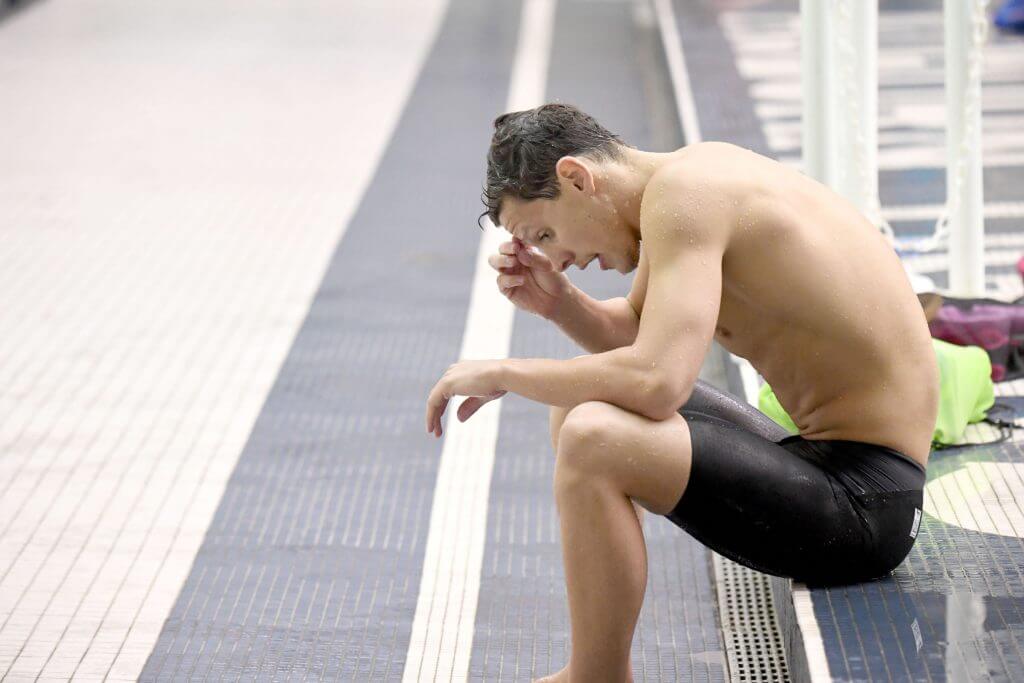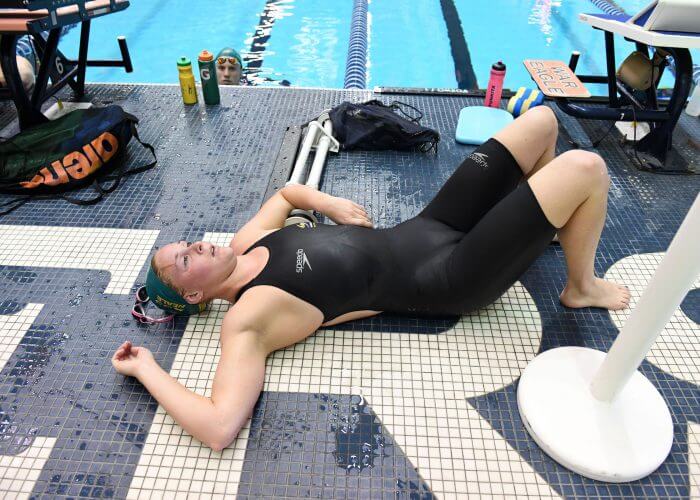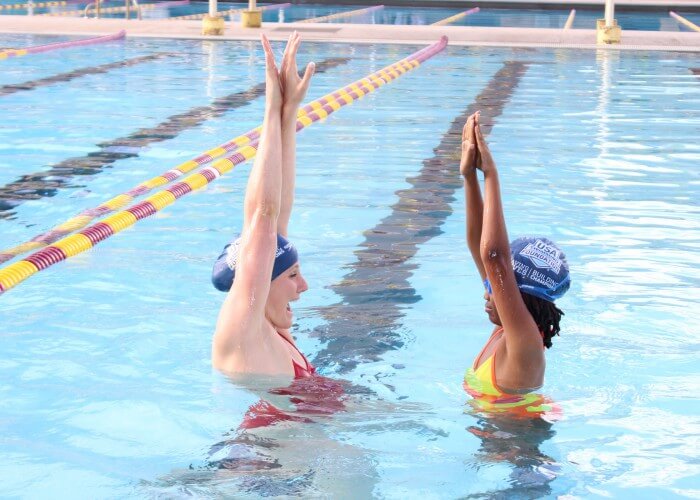How To Bounce Back: Shining Bright after Burnout

By Katie Wingert, Swimming World College Intern.
We know the signs: Groaning during sets, disengagement at meets, half-hearted effort in the weight room. But when burnout hits us, we are often unprepared to respond.
Burnout once attacked me, in the middle of my sophomore year in college. In January, I found myself counting down the weeks to my college conference championship meet. The 25 sprints that my team did together, as a component of our warmup every day, bored me. Even kick sets, which had always been my favorite part of practice, felt monotonous. Regardless of the time I saw on the clock, I felt slow and heavy in the water. I found myself using my time in the pool to count the number of tasks I could be completing during my two-hour practice period if I were not swimming.
My teammates continued to ask me if I was excited for the postseason; my response was always the same: “I’m excited to be done.” My coaches would encourage me during practice, and I’d wonder if they thought I was plateauing. I’m not the only one who has had this experience before. It wasn’t anyone’s fault that they didn’t notice me struggling; it was my fault that I didn’t tell anyone.
Thankfully, in my case, my spring and summer offered me ample time to recover from burnout, and the next season was by far the most successful and enjoyable season of my college career. Our pool was closed for construction in the spring, and in the summer I studied abroad, so I had little time to meaningfully train. Ultimately, the time away from a consistent training cycle allowed me considerable opportunities to consider how I might facilitate my own recovery from burnout. I learned several lessons, which, as it happens, are consistent with current research on athlete burnout.
If you don’t want to be in the water, get out of the water.

Photo Courtesy: Delly Carr / Swimming Australia Ltd.
If it’s your offseason and you are not even wanting to get in and swim a thousand yards, then take a break from the pool. My biggest lesson from the summer was that my body needed a chance to rest from aquatic training. The thought of even putting on a swimsuit made me anxious and unhappy, so I didn’t do so for nearly six weeks.
Such an extreme break from the water is not necessarily merited for everyone, but for many college athletes, staying out of the water for a few weeks after the intensity of the season subsides can be rejuvenating. Set a break period for yourself and stick to it. (Example:”On June 1, no matter how I am feeling, I will get back in the pool.”) As that end date approaches, you will likely begin to crave the feeling of diving into the water again.
Watch sports, and embrace the thrill of being a spectator.

Photo Courtesy: Ray Lewis (Twitter)
Get inspired to do great things in the pool by watching athletes in other arenas. A rousing tennis match, a close baseball game, or even a riveting game of golf will hold your attention and remind you of the adrenaline rush that our sport provides.
By watching sports outside of your area of expertise, you will keep your own accomplishments and failures in perspective, and you will recognize the incredible work ethic and perseverance that every sport–including swimming–requires.
One particularly great way to be a fan of swimming is to find an age-group coaching position over the summer. I coached for a few weeks over the summer, and seeing little eight-and-unders mastering butterfly for the first time or dropping over a minute in a 25 backstroke made me want to get in the pool with them.
Find physical activity you enjoy.

Photo Courtesy: Huffington Post
Swimmers notoriously lack the coordination on land, but that doesn’t mean we can’t enjoy land sports. Staying active on land can keep you in decent shape, if and when you decide to get in the pool, and it will keep you happy. Our bodies are used to the endorphins that exercise provides, so stopping all exercise is a sure-fire way to feel more fatigued and unhappy.
For some of us, the allure of an extensive workout program or the goal of completing a running race might be intriguing. For others, less intense physical activity might be necessary to fight off the feelings of burnout we’ve experienced on land. In that case, more social or scenic activities like hikes, brisk walks, or dance classes might work well. Regardless, changing up your activity will help you avoid boredom.
Talk to your coach.
It can be difficult to be frank with your coach when you don’t want to be in the water. But your coach wants you to be honest, and your coach has probably had experience navigating burnout–whether as an athlete or as a mentor for other swimmers before you.
Trust your coach to support you and encourage you, and don’t be afraid to respectfully tell him or her if you don’t think something is going to help you get back on track for the long-term. Even if you do take a break from the water, communicating regularly with your coach about your life will maintain a bond of trust between the two of you.
Start fresh.

Photo Courtesy: Taylor Brien
Odds are, when you first learned to support yourself in the water, you likely had no agenda other than to survive. There is nothing quite like watching someone first learn to swim across a pool. The joyful surprise of a new swimmer is simply beautiful to behold.
When you get in the pool, seek to rediscover those feelings of enjoyment and contentment. Play in the water, whether in an organized game of water polo or an informal splash war with a teammate.
If you swim a practice, ask yourself what was beautiful about your swim. What did you learn about yourself, your coach, and your teammates? What was your favorite part of your swim? At first, this positive thinking might feel childish, but over time, you will notice improvement in your mood and work ethic.
All commentaries are the opinion of the author and do not necessarily reflect the views of Swimming World Magazine nor its staff.




Great advice. ..
Connor Leone